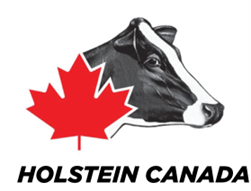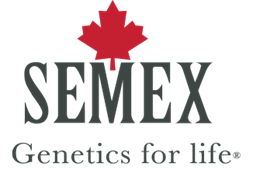Designing a Reference Population to Accelerate Genetic Gains for Novel Traits in the Canadian Holstein Herd
Complete

Project Overview
Genomic selection has played a major role in Canadian dairy cattle breeding programs. However, in order to remain a world leader in the competitive international market, novel traits and methodological approaches must be included in future breeding programs for Canadian dairy. The goals of the project were to provide tools to maximize the rate of genetic progress for novel traits and develop a reference cow population for current and future research and development.
What Did the Research Team Do?
To begin, a national cow reference population of ~26,000 genotyped cows was created. Several studies were carried out to generate tools that would maximize the rate of genetic progress for novel traits by looking at the impact of incorporating “omics” information into Canadian dairy cattle breeding programs. Genomic evaluations were conducted for hoof health, fertility disorders, feed efficiency, and methane efficiency, as well as gametic incompatibility, size and position score of the reproductive tract, and heat tolerance.
What Did the Research Team Find?
While many results were achieved through this research, a few notable findings are:
- Using available breeding data, artificial Intelligence (AI) can help identify cows under timed artificial insemination, allowing for improved evaluation of cow fertility.
- An ease to record size and position score of the reproductive tract is 2-3 times more heritable than most of currently evaluated fertility traits and is highly genetically correlated to key fertility traits, such as number of services to conception, making it a prospective indicator trait for selection for improved fertility.
- Using publicly available weather data, genetic evaluation will allow for the identification and selection of more heat tolerant cows.
- Methane production is moderately heritable and can be predicted by milk mid-infrared spectra and used for genetic selection to mitigate methane emissions in dairy cows.
- After analyzing data from almost 300,000 Holstein offspring, dam, and sire trios, several regions of the genome were found to influence the gametic compatibility of the sire-dam combinations. This information could potentially be integrated in mating plans in the future.
- Using imputed whole-genome sequence genotypes, a comprehensive identification of genomic variants and candidate genes that simultaneously influence more than one fertility and reproduction traits in Holstein cattle was carried out, helping to better understand genetic background of these traits.
- A national cow reference population of ~26,000 genotyped cows was created and has been instrumental for genomic evaluation and research on the genetic architecture of traditional and novel traits, such as feed efficiency, methane efficiency, and hoof health.
**Scroll down for project communication outputs**
Principal Investigators
Flavio Schenkel
University of Guelph
Co-Investigators
Christine Baes
University of Guelph
Angela Canovas
University of Guelph
Janusz Jamrozik
University of Guelph
Key Words
- Genomic selection, breeding, novel traits, genetic progress, genomic evaluation
Period: 2018-2023
Budget: $999,922
Last Updated: January 12, 2024
Note: As per the research agreement, aside from providing financial support, the funders have no decision-making role in the conduct of the studies, data collection, and analysis or interpretation of the data. Researchers are independent in conducting their studies, own their data, and report the outcomes regardless of the results. The decision to publish the results rests entirely with the researchers.
PROJECT COMMUNICATION OUTPUTS
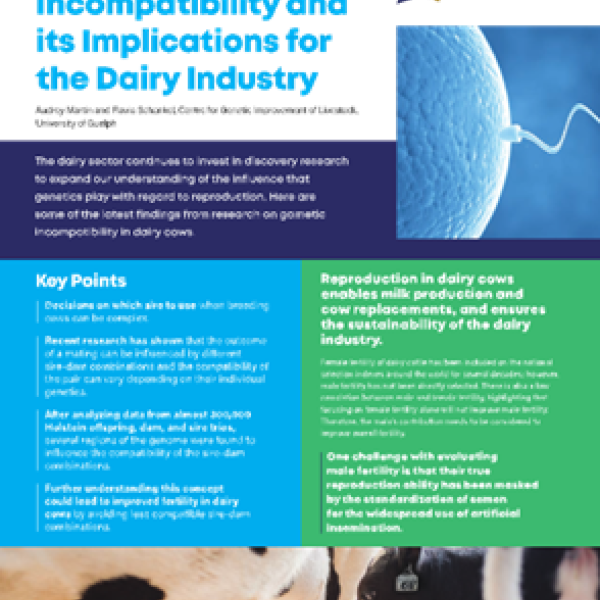
INFOGRAPHIC
DOWNLOADWEBINAR
Improving Heat Tolerance, Predicting Methane Emissions, and Impacts of AI on Genetic Evaluations
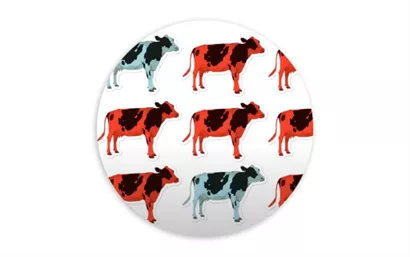
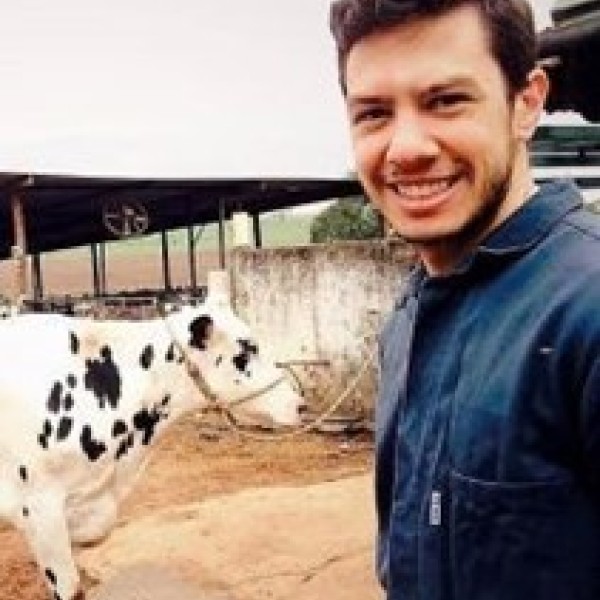
PODCAST
LISTEN
PODCAST
LISTENPROJECT PUBLICATIONS
-
Kamalanathan, S., K. Houlahan, F. Miglior, T.C.S. Chud, D.J. Seymour, D. Hailemariam, G. Plastow, H. R. de Oliveira, C.F. Baes, F.S. Schenkel. 2023. Genetic Analysis of Methane Emission Traits in Holstein Dairy Cattle. Animals 13(8): 1308. https://doi.org/10.3390/ani13081308
-
Sousa Junior, L.P., L.F.B. Pinto, V.A.R. Cruz, G.A. Oliveira Junior, H.R. Oliveira, T.S. Chud, V.B. Pedrosa, F. Miglior, F.S. Schenkel, L.F. Brito. 2023. Genome-wide association and functional genomic analyses for various hoof health traits in North American Holstein cattle. J. Dairy Sci. In press. https://doi.org/10.3168/jds.2023-23806
-
de Souza, T.C., L.F.B. Pinto, V.A. Rocha de Cruz, H.R. de Oliveira, V.B. Pedrosa, G. A. Oliveira Junior, F. Miglior, F.S. Schenkel, L.F. Brito. 2023. A comprehensive characterization of longevity and culling reasons in Canadian Holstein cattle based on various systematic factors. Transl. Anim. Sci. 7(1): txad102.
https://doi.org/10.1093/tas/txad102 -
Alves, K., L.F. Brito, M. Sargolzaei, F.S. Schenkel. 2023. Genome-wide association studies for epistatic genetic effects on fertility and reproduction traits in Holstein cattle. J. Anim. Breed Genet. 40:624–637. http:// doi.org/10.1111/jbg.12813
-
Rockett, P.L., I.L. Campos, C.F. Baes, D. Tulpan, F. Miglior, F.S. Schenkel. 2022. Phenotypic analysis of heat stress in Holsteins using test-day production records and NASA POWER meteorological data, J. Dairy Sci. 106 (2): 1142-1158.
https://doi.org/10.3168/jds.2022-22370 -
Martin, A.A.A., S. Id-Lahoucine, P.A.S. Fonseca, C.M. Rochus, L.M. Alcantara, D. Tulpan, S.J. LeBlanc, F. Miglior, J. Casellas, A. Cánovas, C.F. Baes, F.S. Schenkel. 2022. Unravelling the genetics of non-random fertilization associated with gametic incompatibility, Sci. Rep. 12: 22314.
https://doi.org/10.1038/s41598-022-26910-8 -
Campos, I.L., T.C.S. Chud, G.A.O. Junior, C.F. Baes, A. Cánovas, F.S. Schenkel, 2022. Estimation of Genetic Parameters of Heat Tolerance for production traits in Canadian Holsteins cattle. Animals 12 (4): 3585.
https://www.mdpi.com/2076-2615/12/24/3585 -
Saeed, S. T.C.S. Chud, D. Hailemariam, H.R. Oliveira, G. Plastow, P. Stothard, J. Lassen, R. Baldwin, F. Miglior, C.F. Baes, D. Tulpan, F.S. Schenkel. 2022. Predicting dry matter intake in Canadian Holstein dairy cattle using milk mid-infrared reflectance spectroscopy and other commonly available predictors via artificial neural networks. J. Dairy Sci. 105 (10): 8257-8271.
https://doi.org/10.3168/jds.2021-21297 -
Alcantara, L.M., F.S. Schenkel, C. Lynch, G.A. Oliveira Junior, C.F. Baes, D. Tulpan. 2022. Machine learning classification of breeding protocol descriptions for Canadian Holsteins. J. Dairy Sci. 105 (10): 8177-8188.
https://doi.org/10.3168/jds.2021-21663 -
Martin, A.A.A., G. de Oliveira Jr., A.M.L. Madureira, F. Miglior, S.J. LeBlanc, R.L.A. Cerri, C.F. Baes, F.S. Schenkel. 2022. Reproductive tract size and position score: Estimation of genetic parameters for a novel fertility trait in dairy cows. J. Dairy Sci. 105 (10): 8189-8198. https://doi.org/10.3168/jds.2021-21651
-
Saeed, S., T.C.S. Chud, D. Hailemariam, G. Plastow, H.R. Oliveira, P. Stothard, J. Lassen, F. Miglior, C.F. Baes, D. Tulpan, F.S. Schenkel. 2022. Predicting methane emission in Canadian Holstein dairy cattle using milk mid-infrared reflectance spectroscopy and other commonly available predictors via artificial neural networks. J. Dairy Sci. 105 (10): 8272-8285.
https://doi.org/10.3168/jds.2021-21176 -
Alcantara, L.M., C.F. Baes, G.A. de Oliveira Junior, F.S. Schenkel. 2022. Conformation traits of Holstein cows and their association with a Canadian economic selection index. Can. J. Anim. Sci. 102 (3): 490-500.
https://doi.org/10.1139/CJAS-2022-0013 -
Pedrosa, V.B., F.S. Schenkel, S.-Y. Chen, H.R. Oliveira, T.M. Casey, M.G. Melka, L.F. Brito. 2021. Genomewide Association Analyses of Lactation Persistency and Milk Production Traits in Holstein Cattle Based on Imputed
Whole-Genome Sequence Data. Genes.12(11): 1830. https://doi.org/10.3390/genes12111830 -
Houlahan, K., F.S. Schenkel, D. Hailemariam, J. Lassen, M. Kargo, J.B. Cole, E.E. Connor, S. Wegmann, G.A. Oliveira Junior, F. Miglior, A. Fleming, T.C.S. Chud, C.F. Baes. 2021. Effects of Incorporating Dry Matter Intake and Residual Feed Intake into a Selection Index for Dairy Cattle Using Deterministic Modeling. Animals 11(4): 1157. https://doi.org/10.3390/ani11041157
-
S-Y, Chen, Schenkel, F.S., Melo, A.L.P., Oliveira, H.R., Pedrosa, V.B., Araujo, A.C., Melka, M.G., Brito, L.F. 2022. Identifying pleiotropic variants and candidate genes for fertility and reproduction traits in Holstein cattle via association studies based on imputed whole genome sequence genotypes, BMC Genomics (23): 331.
https://doi.org/10.1186/s12864-022-08555-z -
Malchiodi, F., J. Jamrozik, A.-M. Christen, A. Fleming, G. J. Kistemaker, C. Richardson, V. Daniel, D. F. Kelton, F. S. Schenkel, F. Miglior. 2020. Symposium review: Multiple-trait single-step genomic evaluation for hoof health. J. Dairy Sci. 103: 5346–5353. https://doi.org/10.3168/jds.2019-17755
-
Alves, K.; L.F. Brito, C.F. Baes, M. Sargolzaei, J.A.B. Robinson, F.S. Schenkel. 2020. Estimation of additive and non-additive genetic effects for fertility and reproduction traits in North American Holstein cattle using genomic information. J. Anim. Breed Genet. 137:316–330. https://doi.org/10.1111/jbg.12466
-



